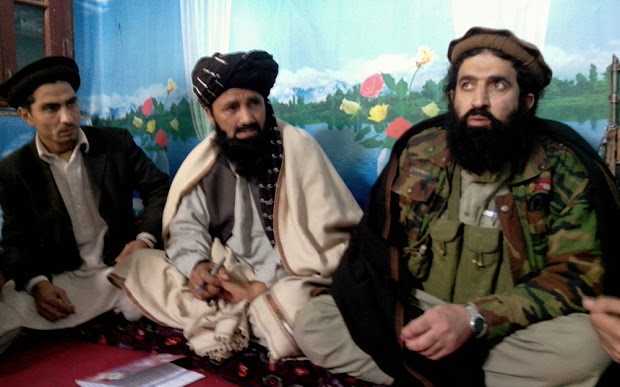Even as the Islamic State was in retreat from Kobani in northern Syria this week, the militant group claimed growing influence farther afield. Fighters loyal to IS said they carried out a deadly attack Tuesday on a hotel in Libya’s capital. The day before, an IS spokesman announced the expansion of the self-styled caliphate in South Asia.
Abu Muhammad al-Adnani declared in an online message “we bring the mujahideen the good news of the Islamic State’s expansion to Khorasan,” a reference to the historical region that now encompasses Afghanistan, Pakistan and what Adnani called “nearby lands.”
Adnani’s comments confirmed what Pakistani security analysts view as a growing threat.
In a video released earlier this month, a band of breakaway Pakistani Taliban militants based in the tribal area swore their allegiance to IS. The video showed dozens of fighters riding horses and waving IS flags. Former Taliban spokesman Shahidullah Shahid appears in the video, speaking Arabic and declaring his allegiance to the IS leader and self-styled caliph Abu Bakr al-Baghdadi.
Last week, Pakistani media reported that security forces had arrested an IS leader, Yousaf Al-Salafi, in the eastern city Lahore.
Pakistan’s government has not confirmed an IS presence in the country. But some mainstream political party leaders have expressed concerns in parliament, calling on the government to take action against the Islamic State before it establishes a foothold.
Those warnings appear to be too late and, according to some observers, Adnani’s declaration will only make any anti-IS fight by the government harder. Pakistani defense analyst and retired army general, Talat Masood told VOA Deewa “Taliban breakaway factions who have announced allegiance to IS otherwise faced isolation. But the announcement will bring them into the fore and magnify their presence.”
According to Khadim Hussain, author of The Militant Discourse, local jihadis will gain more than just publicity. In an interview with VOA Deewa, he said “Pakistan Taliban groups know that allegiance to IS will bring them financial benefits.”
It’s not clear how much material support the Syria- and Iraq-based IS is able to provide to members abroad. Branches of the franchise in Libya appear to be getting some technical training, but reports of money and equipment transfers have not been verified.
What al-Adnani tried to promise in his statement was unity, calling on “all the mujahideen in Khorasan to join the caravan of the caliphate” and abandon factionalism.
But if the internecine battles of jihadis in Syria and Libya are any guide, unity among militants may be a more audacious goal than the establishment of an Islamic State itself.



